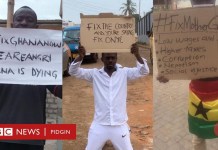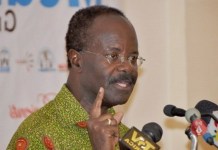Renowned Economist, Dr. Jerry Kombat Monfant, has warned that President Akufo-Addo’s recent open call for the cancelation of debt owed by African countries could lead to Ghana setting itself up to be blackballed in the global financial market.
In a posted commentary on the President’s call at the Summit on the Financing of African Economies on May 18, 2021, in Paris, Dr. Monfant warned what the President could be setting Ghana up as a country with creditworthiness issues.
“Ghana President, Nana Addo Dankwa Akufo- Addo has asked for debt cancellation owed by African countries. I definitely know we will get to this point as Ghana can no longer sustain the debt burden and rollover risk. But what the President might not be aware is whether a substantial debt would be written off or his action could be setting a stage for a “debt run,” Dr. Monfant wrote.
In a debt run, creditors refuse to roll over their debt if they fear that other creditors will not roll over, in some cases even if the borrower is solvent, the economist explained.
President Akufo-Addo issued an urgent call for immediate economic relief, including the total cancellation of all debts owed by African countries, during his address at the Summit on Financing African Economies.
“Without the ‘fiscal room to breathe,’ Africa could truly become ‘the forgotten continent, and that is why there is an urgent need for comprehensive debt relief and debt cancellation,” The Ghanaian President pleaded.
Analysts have wondered who the President was addressing specifically. If it is traditional lenders who make up the Paris Club, analysts point out, then the cry is rather tone-deaf because these traditional lenders own only 6% of Africa’s debt.
China, which owns at least 21% of the continent’s outstanding debt, has made it clear that it has no plans to provide across-the-board debt cancellation in Africa or elsewhere in the Global South.
According to Dr. Monfant, what the President is asking for is multilateral and bilateral debt restructuring or debt cancellation and that this is a different fold from the borrowing through bond issuance from the Capital Markets.
“This type of multilateral debt cancellation is known in Europe as Paris Club Conversion. This was introduced in 1990 for the Lower-Middle-Income Countries. However, in 1991, it was extended to cover SEVERELY INDEBTED LOW-INCOME COUNTRIES (SILICs),” he wrote.
“Don’t be deceived in believing that substantial debt relief could be granted through this approach by the Paris Club. No! The government cannot achieve that objective. This procedure is only to provide the basic framework for the conversion of Paris Club debt. So far, debt Conversion by the Club has been very limited,” he wrote.
He warns that while the government sees it as harmless to openly seek debt restructuring and cancellation through the Paris Club, a critical trouble to watch would be the perception of the Capital Markets.
Dr. Monfant adds that this action can also put Ghana as a “Debt Intolerant” nation, in that we are less able to sustain high levels of debt to GDP without defaulting. A sudden change in investors’ perception could act as a default trigger.
“Ghana Risk been kicked out of the Capital Markets as investors lose faith in Ghana’s ability to repay its debt,” he warned.














